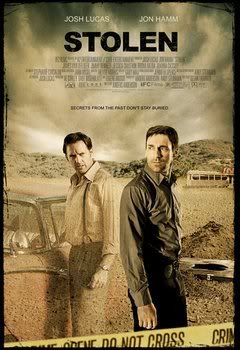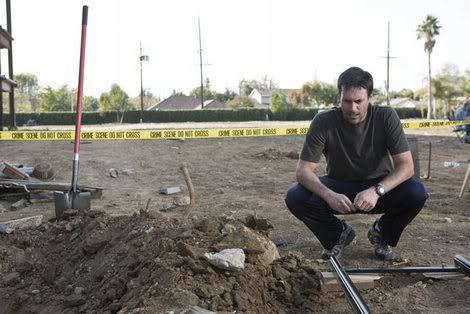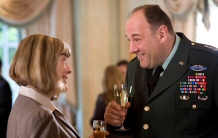When you hear about a movie that stars Jon Hamm (“Mad Men”) and Josh Lucas (“Glory Road,” “Poseidon”) and fleshes out its ensemble with Morena Baccarin (“V,” “Firefly”), Michael Cudlitz (“Southland”), James Van Der Beek (“Dawson’s Creek”), and half a dozen other faces that are instantly recognizable from television and motion pictures, it’s hard not to get excited when you’re pitched the opportunity to speak with the director (Anders Anderson) and the cinematographer (Andy Steinman).

But what happens if, before you see the film, you read on the website RottenTomatoes.com that it’s actually earning the much dreaded 0% rating on the Tomatometer?
Well, if you’re me, then the first thing you do after that is actually watch the film yourself…and, personally, I liked it.
If I had to guess about the reason “Stolen” has received so many sneering reviews, it’s that it bears striking similarities to a couple of high-rated but critically snubbed police procedurals currently airing on network television. But, hey, I like those shows, and I also like the actors in “Stolen,” so if you’re of the same mindset, then you’ll probably like the film, too.
Still, before I got off the line with Messrs. Anderson and Steinman, I felt obliged to buckle up and ask them what they thought about the film’s Tomatometer rating….and, no, the line didn’t go dead immediately after I asked it.
Bullz-Eye: Hi, guys! Good to talk with you.
Anders Anderson: Hey, Will, how are you doing?
Andy Steinman: Hey, Will, nice to talk with you.
BE: Now, I hope you guys don’t mind if I ask you to identify yourselves before you answer questions, just because your voices sound kind of similar.
AA: Yeah, no problem.
AS: They’re actually quite different, but when you’re around someone that long, they start melding into one.
BE: (Laughs) That’s probably what it is. Well, I guess my first question is to ask how you guys first began your collaboration. Had you been friends prior to this project?
AA: Yeah, we had, but I’ll let Andy tell this tale. He’s told it many times.
AS: Yeah, we first met on a short in Santa Fe, NM, that Anders was acting and…I think you were producing it, too, yeah?
AA: Yeah.
AS: And I was a cinematographer, and I came out there, and we just clicked. Talking to him about whatever we had to do with the camera, talking to him about performance, talking to him about movies that we like, how to make the short the best it could be. We just kind of hit it off on what we wanted to do in our careers when we were done with this short, so we started talking about possibly forming a company and trying to do movies that we wanted to do. And it was just one of those things where we talked to each other and asked, “Well, what do we do next?” And the answer was always, “Well, we’ve got to make a feature.” And so we started talking about, “How do we make a feature? What do we do?” And we just started that process, step by step, of trying to get a movie made: pulling our resources and connections, however little they were, to try and get a feature off the ground. And we became friends all at the same time.

BE: So how did Glenn Taranto’s script cross your path? Did you know him, or was it pitched to you?
AS: We basically contacted everyone we knew. (Laughs) Friends, family, any type of business connection, and asked, “Does anyone know anyone who has a script? Does anyone have a script? We’re looking for material. We’re just looking for something that we can get behind.” And a production company that we’d worked with in the past basically said, “Here, we have a couple of scripts that we like. Why don’t you take a read?” And, lo and behold, Glenn’s script – which was originally called “Box in the Box” – showed up in front of us, and instantly we knew that something was there was that was a great vehicle to get actors, to get performers to be in our first film. Being first-timers, we knew that a lot of this had to be…we knew that we had to get some really good cast behind us to kind of help get the movie out there, and we thought that script would do that. So we just kind of took it and ran with it.
Continue reading »





